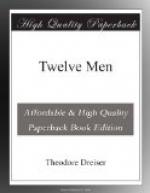I noted at once that he had not aged in the least. He was sixty-two or -three now and as vigorous and trim as ever. And now he treated me as courteously and formally as though he had never browbeaten me in the least. “Good heavens,” I said, “how much better to be a visitor than a guest!” After a moment or two we offered many thanks and sped on, but not without many a backward glance on my part, for the place fascinated me. That simply furnished institution! That severe regimen! This latter-day Stoic and Spartan in his tent! And, above all things, and the most astounding to me, so little could one know him, the book he had been reading and which he had laid upon his little table as I entered—I could not help noting the title for he laid it back up, open face down—was Lecky’s “History of European Morals”!
Now!
Well!
IN RETROSPECT
Two years after this visit, in a serious attempt to set down what I really did think of him, I arranged the following thoughts with which I closed my sketch then and which I now append for what they may be worth. They represented my best thought concerning him then:
“Thomas Culhane belongs to that class of society which the preachers and the world’s army of conventional merchants, lawyers, judges and reputable citizens generally are presumably, if one may judge by the moral and religious literature of the day, trying to reach and reform. Yet here at his sanitarium are gathered representatives of those same orders, the so-called better element. And here we see them suddenly dominated, mind and soul, by this being whom they, theoretically at least, look upon as a brand to be snatched from the burning.
“As the Church and society view Culhane, so they view all life outside their own immediate circles. Culhane is in fact a conspicuous figure among the semi-taboo. He has been referred to in many an argument and platform and pulpit and in the press as a type of man whose influence is supposed to be vitiating. Now a minister enters the sanitarium, broken down by his habits of life, and this same Culhane is able to penetrate him, to see that his dogmatic and dictatorial mental habits are the cause of his ailment, and he has the moral courage to shock him, to drag him by apparently brutal processes out of his rut. He reads the man accurately, he knows him better than he knows himself, and he effects a cure.
“This astonishing condition is certainly a new light for those seeking to labor among men. Those who are successful gamblers, pugilists, pickpockets, saloon-keepers, book-makers, jockeys and the like are so by reason of their intelligence, their innate mental acumen and perception. It is a fact that in the sporting world and among the unconventional men-about-town you will often find as good if not better judges of human nature than elsewhere. Contact with a rough and ready and all-too-revealing world teaches them




